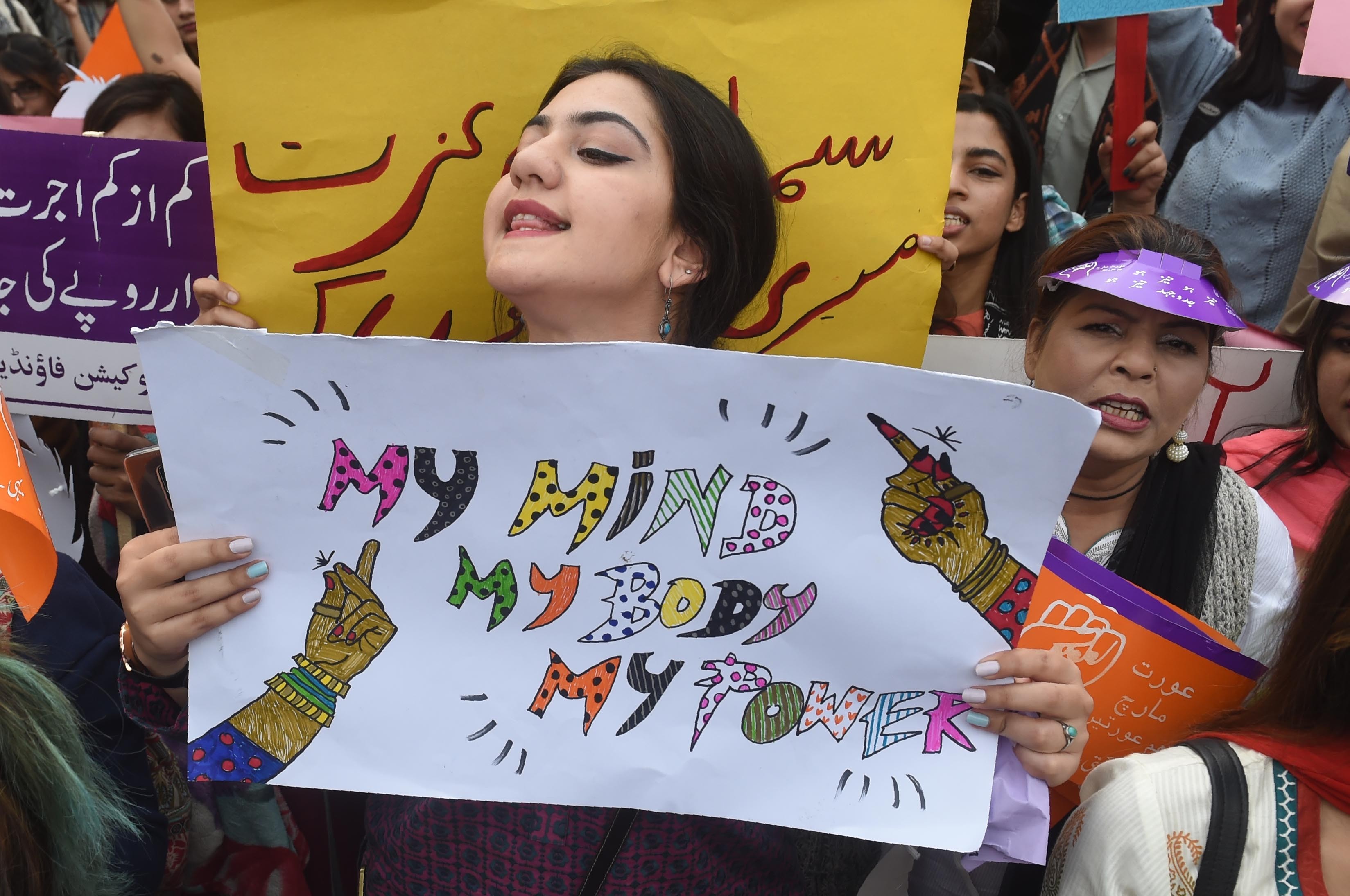

I don’t really remember when I started to solace myself in walking. When I am sad, I go for a walk. When I am angry, I go for a walk. When I am happy, I just stumble, and roam around aimlessly. One reason is to tire my body to the point that it starts to resonate with the tiredness of my mind. Another is that I find it rebellious to reclaim my city, my roads, and my body by my mere presence in public space, and that too, aimless, at times.
But everything comes with a price. Being a woman, why do you expect to just walk on a footpath and not being stared at and commented on by bikers or passersby? Why do you even expect that cars won’t stop unsolicited and you won’t be asked, "Kitnay mein?" (for how much?!) Why do you expect to not be groped by random men in the metro bus? All this alienates me from my own body as well as my city, and pushes me into hating both.
This was one of the many reasons that I decided to participate in Aurat March 2019. Marching along with thousands of women on the same road which were once hostile and alien, now suddenly felt safe, even if it was for some hours. The strength and beauty of this march was not only that it was inclusive and representative of people from different backgrounds and from across the gender spectrum, but also how it challenged the deeply ingrained patriarchal narratives through creative, witty yet fierce takes on issues faced by women in public and private spheres.
The response to the march has been divided, as expected. People who were once neutral to the idea of ‘feminism’ are now drawing boundaries between good and bad feminism, with of course, good feminists being those who don’t question the hetero-patriarchal status quo. Others, mostly men, who’ve only read feminism through Facebook memes or second- and third-hand information, have taken charge to tell what the ‘real feminism’ is, while the rest of them still clings to their rigid and conservative approach towards feminism masquerading under religion’s cloak. No doubt, it always sells.
But this debate of good feminism-vs-bad feminism and real-vs-unreal issues is no one’s ground to play. At the march in Lahore, there were women from all ages and diverse backgrounds, each with their own problems to talk about. Every message written on the placards not only represented an underlying issue of oppressive gender norm, but was also an expression of long suppressed anger from subjugation and suffocation.
Having said that, the reaction to many placards by the so-called intellectuals and left-leaning liberals has exposed their hypocrisy. What’s more damaging has been the attitude of media channels which, violating all ethics of journalism and taking the opportunity to increase their ratings (as they always do), portrayed Aurat March as some sort of an ‘evil’ gathering to perform necromancy which might burn the Pakistani society to ashes overnight.
The narrative they were trying to sell was evident in their selection of certain placards which they broadcast with captions like "koi sharam hoti hai, koi haya hoti hai!"
Where an Orya Maqbool Jan made a furious claim that the one placard which asked men to stop sending unsolicited photos of their private parts trespasses his fundamental rights, and the Supreme Court should take suo moto action against the march organisers, Parliamentarian Amir Liaqat asked the prime minister to intervene, and another announced (during a parliamentary session) lodging an FIR against Aurat March for threatening Islamic religious and family values.
Then came Lollywood star Shan Shahid who called the same placard against our cultural values. Might we recall here how his films objectified women to the hilt?
But the larger question is as to what actually is ‘indecent’ behaviour and against our ‘culture’: men sending unsolicited pictures of their private parts to women, or women calling them out for it?
The fact that many women and girls have evidently received gender-based slurs, rape and death threats because of organising and participating in the march, is very much the reason we marched.
The fact that 14 men were involved in the gang rape of Mukhtaran Mai and that too, to redeem the tribal honour, and after 19 years, 13 of them are still roaming free is the reason this post-feminist critique is merely irrelevant. Because the people crying about the real issues and good/bad feminisms were neither present then nor now.
The fact that a woman saying "tumhara mauza kahan hai, mujhay kya maloom" offends you more than Afzal Khohistani‘s brutal murder for spearheading Kohistan’s fight against customary honour killing, is the very reason we need more marches like this one.
The fact that a woman in Lahore is killed by her husband for serving cold food is less provocative for you than a woman holding a placard asking "khana khud garam karma seekh liya?" and you choose to troll the latter and accuse her of breaking the familial system is the reason we need more marches.
The language born out of the feminist struggle has only one mantra: Resistance is fertile. No matter what response it is met with, women solidarity will keep growing.